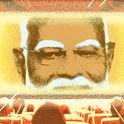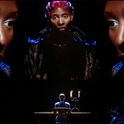Max Hastings's All Hell Let Loose tells the history of the second world war from the point of view of ordinary people
Looking at my year’s list of “Books Read”—a custom that has remained quaintly unchanged since the knowledge-hungry years of late teens—reminds me that I now make an active effort to free myself from the tyranny of the new, from the compulsion to keep up with the latest thing. And while a more astute observer might be able to detect underlying trends in publishing—less historical fiction, more biography or whatever—I can’t discern any pattern in my own reading other than a continuing increase in the portion occupied by non-fiction. But here are the highlights from my reading of this year’s new books.
Manning Marable’s Malcolm X: A Life of Reinvention (Allen Lane) does not have quite the breadth and sweep of Taylor Branch’s trilogy about “America in the King Years”—how could it?—but is, inevitably, about more than just one man. Partly this is because Malcolm seemed to lead so many different lives in the brief span of his 39 years; partly it’s because he was so susceptible to whatever he encountered—even when what he encountered was largely shaped by his own participation. It is striking, in Marable’s account, how many calamitously bad decisions and pronouncements Malcolm made, not just with the benefit of hindsight but within the range of options available to him at any one time—and yet there was a constant forward and ameliorative momentum to his life. Marable is intensely sympathetic but always conscious of the contradictions of his subject, not least regarding his eventually fatal relationship with the Nation of Islam. For all its emancipatory imperatives, one of the attractions of Elijah Muhammad’s organisation was that it demanded a slave-ish adherence to orders. And while Malcolm became famous and feared for his violent rhetoric—much of it directed against the principle of non-violence—by 1963 “the only real damage the Nation had inflicted in the past half decade had targeted its own misbehaving members.” Marable died just before his book was published; it was sad, of course, that he did not live to enjoy the acclaim that was his due but it is a cause for celebration that he completed the book which felt like the fulfilment of a life’s work.
Do you remember that joke from the 1980s? “How many radical feminists does it take to change a light bu- ?” “That’s not funny.” Ah, how times have changed, now that one of the funniest writers around is a lesbian, feminist, literary scholar and critic. Yes, 2011 will be remembered—by me at least—as the year I fell in love with Terry Castle. Her hilarious, affectionate, infuriated—and, some would claim, not entirely reliable—reminiscence of her lopsided friendship with Susan Sontag is one of seven wonderful autobiographical essays collected in The Professor, paragraphs of which were blurred and blotted by tears of laughter. All credit to Tuskar Rock Press for publishing it in Britain, especially since a number of impressive books have yet to find a home on this side of the Atlantic. I concede that Errol Morris’s Believing is Seeing (Penguin, US) might be a tad too specialised—obsessive forensic examinations of Roger Fenton’s pictures of a cannonball-strewn valley in the Crimea, and the snaps of prisoners in Abu Ghraib—but if you are interested in photography it is essential and riveting. Another US-only release this year was Pulphead (Farrar, Straus & Giroux, US) by John Jeremiah Sullivan—a collection of wild and wildly brilliant essay-excursions and corrupted journalistic assignments.
The year’s most original book was Evelyn Juers’s House of Exile (Allen Lane), a group biography of writers and intellectuals who fled Nazi Germany and found themselves, variously, in Europe or America. It’s a complete one-off, so confident of its style and mission that it never seems to pause to consider what kind of book it is. The combination of deep knowledge, artistry and sympathetic imagining opens up new fields of narrative possibility rather than—as is often the case—filling in a few cracks in the market with pre-formed grout.
Two books of reporting made deep but different impressions: Janet Malcolm’s characteristically incisive account of a murder trial, Iphigenia in Forest Hills (Yale) and Richard Lloyd Parry’s extensive, infinitely disturbing People Who Eat Darkness (Cape) about the disappearance (and dreadful fate) of Lucie Blackman in Japan.
Alan Hollinghurst’s The Stranger’s Child (Picador) stood out among this year’s fiction. In some quarters it was felt that the extended period covered meant that the novel lacked the dramatic cohesion of The Line of Beauty. My experience was almost the exact opposite: it seemed even more remarkable that the exquisite flexibility of the prose was maintained over the book’s considerable historical distance. The absence from the Booker longlist of Edward St Aubyn’s similarly elegant At Last (Picador) was excusable—or at least the discrepancy between this omission and the ecstatic reviews that greeted its publication was explicable—if the book was considered solely as a rather slight stand-alone volume rather than as the moving conclusion to an epic five-part sequence. I gorged myself on Jeffrey Eugenides’s The Marriage Plot (4th Estate) for about three days, thoroughly enjoyed the experience—and then felt as if I had scoffed an enormous meal which left me with a hunger of which I had been unaware before starting out.
Which might be why, after a certain age, a man always turns for readerly sustenance to military history. Max Hastings was faced with a bit of a problem in All Hell Let Loose (Harper Collins), his history of the second world war: namely that he’d already written parts of it in books such as Overlord, Bomber Command, Armageddon (masterly, all of them) and Nemesis (about the Pacific War, which felt rather hurried). To avoid repetition he played down some of the most important events but emphasised the experience of war from the point of view of ordinary people caught up in its catastrophic unfolding. One’s only fear, now, is that he might have run out of war.
Looking at my year’s list of “Books Read”—a custom that has remained quaintly unchanged since the knowledge-hungry years of late teens—reminds me that I now make an active effort to free myself from the tyranny of the new, from the compulsion to keep up with the latest thing. And while a more astute observer might be able to detect underlying trends in publishing—less historical fiction, more biography or whatever—I can’t discern any pattern in my own reading other than a continuing increase in the portion occupied by non-fiction. But here are the highlights from my reading of this year’s new books.
Manning Marable’s Malcolm X: A Life of Reinvention (Allen Lane) does not have quite the breadth and sweep of Taylor Branch’s trilogy about “America in the King Years”—how could it?—but is, inevitably, about more than just one man. Partly this is because Malcolm seemed to lead so many different lives in the brief span of his 39 years; partly it’s because he was so susceptible to whatever he encountered—even when what he encountered was largely shaped by his own participation. It is striking, in Marable’s account, how many calamitously bad decisions and pronouncements Malcolm made, not just with the benefit of hindsight but within the range of options available to him at any one time—and yet there was a constant forward and ameliorative momentum to his life. Marable is intensely sympathetic but always conscious of the contradictions of his subject, not least regarding his eventually fatal relationship with the Nation of Islam. For all its emancipatory imperatives, one of the attractions of Elijah Muhammad’s organisation was that it demanded a slave-ish adherence to orders. And while Malcolm became famous and feared for his violent rhetoric—much of it directed against the principle of non-violence—by 1963 “the only real damage the Nation had inflicted in the past half decade had targeted its own misbehaving members.” Marable died just before his book was published; it was sad, of course, that he did not live to enjoy the acclaim that was his due but it is a cause for celebration that he completed the book which felt like the fulfilment of a life’s work.
Do you remember that joke from the 1980s? “How many radical feminists does it take to change a light bu- ?” “That’s not funny.” Ah, how times have changed, now that one of the funniest writers around is a lesbian, feminist, literary scholar and critic. Yes, 2011 will be remembered—by me at least—as the year I fell in love with Terry Castle. Her hilarious, affectionate, infuriated—and, some would claim, not entirely reliable—reminiscence of her lopsided friendship with Susan Sontag is one of seven wonderful autobiographical essays collected in The Professor, paragraphs of which were blurred and blotted by tears of laughter. All credit to Tuskar Rock Press for publishing it in Britain, especially since a number of impressive books have yet to find a home on this side of the Atlantic. I concede that Errol Morris’s Believing is Seeing (Penguin, US) might be a tad too specialised—obsessive forensic examinations of Roger Fenton’s pictures of a cannonball-strewn valley in the Crimea, and the snaps of prisoners in Abu Ghraib—but if you are interested in photography it is essential and riveting. Another US-only release this year was Pulphead (Farrar, Straus & Giroux, US) by John Jeremiah Sullivan—a collection of wild and wildly brilliant essay-excursions and corrupted journalistic assignments.
The year’s most original book was Evelyn Juers’s House of Exile (Allen Lane), a group biography of writers and intellectuals who fled Nazi Germany and found themselves, variously, in Europe or America. It’s a complete one-off, so confident of its style and mission that it never seems to pause to consider what kind of book it is. The combination of deep knowledge, artistry and sympathetic imagining opens up new fields of narrative possibility rather than—as is often the case—filling in a few cracks in the market with pre-formed grout.
Two books of reporting made deep but different impressions: Janet Malcolm’s characteristically incisive account of a murder trial, Iphigenia in Forest Hills (Yale) and Richard Lloyd Parry’s extensive, infinitely disturbing People Who Eat Darkness (Cape) about the disappearance (and dreadful fate) of Lucie Blackman in Japan.
Alan Hollinghurst’s The Stranger’s Child (Picador) stood out among this year’s fiction. In some quarters it was felt that the extended period covered meant that the novel lacked the dramatic cohesion of The Line of Beauty. My experience was almost the exact opposite: it seemed even more remarkable that the exquisite flexibility of the prose was maintained over the book’s considerable historical distance. The absence from the Booker longlist of Edward St Aubyn’s similarly elegant At Last (Picador) was excusable—or at least the discrepancy between this omission and the ecstatic reviews that greeted its publication was explicable—if the book was considered solely as a rather slight stand-alone volume rather than as the moving conclusion to an epic five-part sequence. I gorged myself on Jeffrey Eugenides’s The Marriage Plot (4th Estate) for about three days, thoroughly enjoyed the experience—and then felt as if I had scoffed an enormous meal which left me with a hunger of which I had been unaware before starting out.
Which might be why, after a certain age, a man always turns for readerly sustenance to military history. Max Hastings was faced with a bit of a problem in All Hell Let Loose (Harper Collins), his history of the second world war: namely that he’d already written parts of it in books such as Overlord, Bomber Command, Armageddon (masterly, all of them) and Nemesis (about the Pacific War, which felt rather hurried). To avoid repetition he played down some of the most important events but emphasised the experience of war from the point of view of ordinary people caught up in its catastrophic unfolding. One’s only fear, now, is that he might have run out of war.











